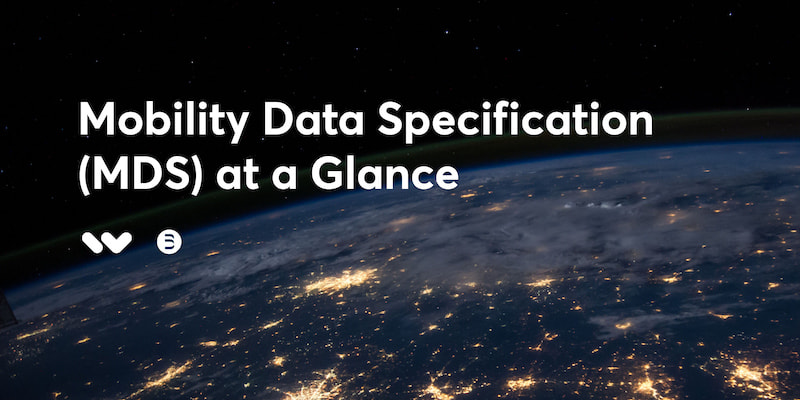The Digital Age is, by its very definition, built on data. Data is the backbone of research, information and experimentation; in our modern world, data is quite literally everywhere. And since data has become so prevalent, we know that without data collection, it’s hard to make well-informed decisions.
Lesen Sie diesen Artikel auf Deutsch.
Even though everyone can agree on the usefulness of data analysis, for many mobility companies and local governments, reliable data infrastructure is still in its infant stages. That’s why, in an attempt to level the playing field and provide a framework for cities, the Los Angeles Department of Transportation (LADOT) created the Mobility Data Specification standard, or MDS.
Simply put, MDS consists of three different APIs: the provider API, implemented by mobility operators or providers and used by regulatory bodies, uses historical data to give cities a standardized framework to work with. The agency API is implemented by local governments for mobility operators and looks at status changes, for example when a user starts a new trip on a sharing scooter, or locks a shared car before exiting the vehicle. Last but not least, the policy API is implemented by government bodies for operators and informs operators of regulations and rules, checks if they’re being compliant with those rules and allows them to adjust their offerings accordingly. (1)
Mobility Data Specification was designed to provide cities with a chance to analyze and regulate a mishmash of private and public mobility offerings operating in their area. This is extremely important, as it gives cities level footing in an increasingly interconnected world and enables them to plan, decide and act on data accordingly and to the benefit of their residents. A key component of MDS is giving governments a chance to regulate, something difficult to do in our digital society without an abundance of data on your side.
Terms like an “abundance of data” understandably make end users uncomfortable. Dystopian visions of Big Brother-esque data collection systems, in which highly sensitive and personal data is shared freely with the government, are still a long way off, but many users are rightly skeptical of sharing their data with cities and/or companies. That being said, it’s important to note that no personal rider or user information is ever shared by operators with cities under MDS guidelines, as no personal data is needed to make policy decisions.
In Europe, healthy skepticism of MDS goes a bit further due to the fact that some elements of it seem at odds with guidelines put forth by the GDPR. If you live on the European continent, the GDPR needs no introduction. It’s the most famous piece of legislation on privacy and data in the world. When it comes to data security, limitation and accuracy - all very important topics covered by the GDPR - it’s true that MDS doesn’t go into explicit detail. But it’s also important to note that MDS is at its heart a set of guidelines designed to help cities gain an overview, and not an enforceable set of laws that restricts the rights of cities and operators. That means that it is in cities’ best interest to utilize the parts of MDS that work for them.
One part of MDS that often garners negative attention is real-time data collection. MDS suggests that the start and end location of every trip should be recorded in real time, and the actual, detailed route taken between those locations should be recorded within 24 hours. (2) Do cities need that data to make informed policy decisions? The short answer is ‘yes’: without that data, cities aren’t capable of staying competitive with private operators. But that doesn’t mean that it has to be real-time data - data collection can be delayed and aggregated without losing its effectiveness.
Despite the fact that MDS may lack extreme detail, it is nonetheless a supremely important and flexible set of specifications which is far more helpful than harmful to municipalities. The pioneering system is unrivaled in the industry - so far, it’s the most comprehensive framework cities have for analyzing very useful data. When cities gain an overview of mobility offerings, they are empowered to regulate them accordingly, which ultimately provides a better quality of life for city residents. Because if we’ve learned anything from our data-driven society, it’s that urban planning decisions based on actual data will always be smarter than making assumptions.
But as we use data to our collective advantage, it’s crucial that we respect the privacy of its creators. The value of mobility data is just starting to be understood; we would be doing ourselves a disservice if we risked losing the trust of users and operators by not reminding them frequently that cities are on their side and are glad to act as liaisons between private companies and the public.
MDS, with its flexible implementation, is proof that all new data frameworks need to be thoroughly scrutinized and discussed before being put into practice. Since we’re just at the beginning stages of mobility data analysis, this is an excellent time to work towards creating a framework that’s functional and beneficial for everybody. This is a collaborative effort, success of which will directly correspond to how well all parties work together. That means that now more than ever, we need to rely on the cooperation of private operators and municipalities to join forces in building an efficient, shared future for everyone. Creating data-driven frameworks that keep the interests of both the private and public sectors in mind is a good place to begin.
